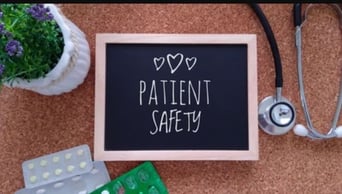
Healthcare workers want to keep patients safe and provide high quality care. Unfortunately, despite best intentions, erroneous, substandard, and unequal care are still too common, harming 1 in 10 hospitalized patients in the US. Today’s evidence-based Patient Safety Organizations (PSOs) are working toward zero-avoidable-harm healthcare. Choosing the right PSO can help your organization reach this goal.
The World Health Organization defines Patient Safety as: “A framework of organized activities that creates cultures, processes, procedures, behaviors, technologies and environments in health care that consistently and sustainably lower risks, reduce the occurrence of avoidable harm, make errors less likely and reduce the impact of harm when it does occur.”
In 2001 the Institute of Medicine (now the National Academy of Medicine) listed 3 must-haves to prevent harm to patients by using an emphasis on the system of care delivery that “(1) prevents errors; (2) learns from the errors that do occur; (3) is built on a culture of safety that involves health care professionals, organizations, and patients”. A mature organization will not only put systems in place that make it hard to commit an error but will also learn and improve when a problem occurs, thanks to a culture where healthcare workers, patients and their families feel comfortable speaking up.
The Patient Safety and Quality Improvement Act (PSQIA) of 2005 created Patient Safety Organizations (PSO) as federally listed 3rd parties who can legally receive confidential healthcare information, provide objective analysis & advice to member healthcare organizations on an aggregated, non-identifiable basis.
Why is the PSQIA important? Healthcare providers used to be reluctant to discuss errors or near-miss events because of the potential discovery during a malpractice lawsuit. The federal PSQIA provides strong protection, applies consistent national standard for scope and types of protected activities and information. The information is not subject to subpoena in civil, criminal, administrative proceedings, not subject to discovery, not admissible into evidence, and not subject to the Freedom of Information Act. The privilege and confidentiality of patient safety work product information can never be waived, thus encouraging candid deliberation of patient safety issues within a healthcare system.
A PSO’s primary activity must be to conduct activities to improve patient safety and health care quality. Information reported to or developed by a PSO for the purpose of conducting patient safety activities is protected and the PSO's workforce must have expertise in analyzing patient safety events.
Different levels of support may be provided by a PSO but will always focus on improving quality, safety, and healthcare outcomes by providing a level of expertise in areas of importance to the provider (3). A PSO can convene its reporting providers in a protected environment to leverage learning, aggregate greater numbers of events than any single provider, use data shared to show a broader perspective on patient safety for hospitals, medical practices, and outpatient centers, and can consult on root cause analyses (RCAs), corrective action planning, process improvement, surveys such as the Culture of Safety Survey, or hazard and risk assessments (https://www.ecri.org/solutions/patient-safety-organization/ ).
The Office of the Inspector General (OIG) published a report in 2019 emphasizing the value of joining a PSO. (4) It found that “Over half of general acute-care hospitals work with a PSO, and nearly all of them find it valuable. Among hospitals that work with a PSO, 80 percent find that the PSO’s feedback and analysis on patient safety events have helped prevent future patient safety events.” And, as one of our own clients put it: “Through participation in a PSO, hospitals are not only able to strengthen their own internal culture of safety and safety practices, but they are also able to contribute to the strengthening of the culture of safety and reliability of the entire US healthcare industry” (Abraham Segres, Vice President, Quality and Patient Safety, Executive Director, Center for Healthcare Excellence, Virginia Hospital & Healthcare Association).
You can learn more about the nation’s leading federally certified Patient Safety Organization (PSO), ECRI and the Institute for Safe Medication Practices PSO here and register for a free demo.
